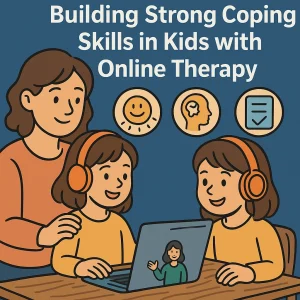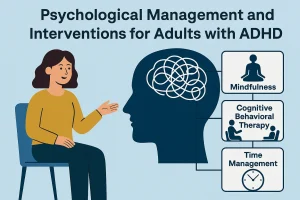Effective Online Therapy Techniques to Handle Bullying
Last Updated: August 10, 2024
Bullying is a pervasive problem that transcends environments, impacting individuals at school, work, and online. It’s not just the immediate hurt that bullying inflicts, but the enduring emotional and physical scars that can lead to anxiety, depression, and post-traumatic stress disorder (PTSD). Victims often feel isolated and powerless, making it vital to find effective coping strategies. Online therapy emerges as a crucial resource in this struggle, offering accessible support and practical techniques to counter bullying’s effects. By addressing bullying through online therapy, victims can transform feelings of helplessness into empowerment, navigating their way towards healing and resilience.
Understanding Bullying and Its Effects
Bullying is a complex issue that manifests in various forms, each with its own set of challenges. Understanding the different types of bullying is the first step in addressing the problem effectively.
Types of Bullying:
- Physical Bullying: This is perhaps the most visible form of bullying, involving actions like hitting, pushing, or damaging someone’s belongings. It can leave not only physical scars but also deep emotional wounds.
- Verbal Bullying: Words can be as harmful as actions. Verbal bullying includes name-calling, insults, teasing, and threats. The emotional pain caused by these words can linger long after the comments have been made.
- Social Bullying: Also known as relational bullying, this form involves damaging someone’s reputation or relationships. Exclusion from groups, spreading rumors, and public humiliation are common tactics used in social bullying.
The effects of bullying are far-reaching and can have a profound impact on a person’s emotional and psychological well-being. Victims often experience feelings of anxiety, depression, and low self-esteem. The constant fear and stress associated with bullying can lead to long-term mental health issues, including post-traumatic stress disorder (PTSD).
Emotional and Psychological Toll:
- Anxiety: The fear of when and where the next bullying incident will occur can lead to chronic anxiety. This constant state of worry affects not just the mind but the body, leading to symptoms like headaches, nausea, and sleep disturbances.
- Depression: The relentless nature of bullying can make victims feel hopeless and helpless. Over time, these feelings can develop into depression, a serious mental health condition that requires professional support.
- Low Self-Esteem: Bullying often targets a person’s self-worth, leaving them feeling inadequate or unworthy. This erosion of self-esteem can affect every aspect of a person’s life, from their academic or work performance to their social relationships.
Why Online Therapy is Effective for Dealing with Bullying
Online therapy has become a powerful way to help people cope with bullying. Here’s why it works so well:
1. Accessibility
One of the biggest benefits of online therapy is how easy it is to access. Unlike traditional therapy, which often requires traveling to a therapist’s office, online therapy allows you to get help from the comfort of your own home. This is especially important for those dealing with the emotional pain of bullying. You can schedule sessions at times that work best for you, without the added stress of traveling.
Additionally, online therapy offers a sense of privacy and anonymity. This can be comforting for bullying victims who might feel nervous about seeking help. Being able to connect with a therapist online can make it easier for individuals to reach out and get the support they need.
2. Comfort
The setting where therapy happens can make a big difference in its effectiveness. With online therapy, you can have your sessions in a place where you feel most comfortable—usually your own home. This familiar environment can make it easier for bullying victims to open up and talk about their experiences.
When you feel safe and secure, it’s easier to express your true feelings and start the healing process. The comfort of being at home, combined with the guidance of an online therapist, creates a supportive space for dealing with the effects of bullying.
3. Effective Strategies in Online Therapy
Online therapy is not just convenient and comfortable; it also offers effective strategies tailored to the needs of bullying victims. For example, Cognitive Behavioral Therapy (CBT) helps individuals change negative thought patterns and build resilience. Other strategies like mindfulness practices, role-playing, and assertiveness training can also be effectively used in online sessions.
These techniques do more than just provide immediate relief—they help individuals develop long-term coping skills. By using these tools in daily life, victims of bullying can rebuild their self-esteem and confidence over time.
Traditional Therapy vs. Online Therapy for Bullying
| Feature | Traditional Therapy | Online Therapy |
|---|---|---|
| Accessibility | Limited to local therapists, often requiring travel to a specific location. This can be a barrier for individuals in remote areas or those with limited mobility. | Accessible from anywhere with an internet connection, removing geographical barriers. Allows individuals to connect with a wider range of specialists. |
| Flexibility | Typically involves fixed schedules, with appointments set by the therapist’s availability. Rescheduling can be challenging, and sessions are often limited to standard office hours. | Offers flexible scheduling options, including evenings and weekends. Sessions can be easily rescheduled, providing more convenience for those with busy or unpredictable schedules. |
| Anonymity | Face-to-face interaction in a therapist’s office, which may make some individuals uncomfortable. There is little to no anonymity, as the therapist and patient meet in person. | Provides the option for anonymity, with sessions conducted via text, audio, or video chat. This can make it easier for individuals to open up about sensitive issues without fear of judgment. |
| Comfort | Takes place in an unfamiliar, clinical setting, which may cause anxiety or discomfort for some individuals. The environment might not feel conducive to open communication. | Conducted in the comfort of one’s own home or any preferred location, creating a more relaxed and familiar environment. This can lead to more effective communication and a greater sense of security. |
| Support Options | Primarily involves individual sessions with limited integration of additional tools or resources. Support is often confined to the therapy session itself. | Integrates with a variety of digital support tools, such as apps for tracking progress, mindfulness exercises, and peer support groups. These tools can be accessed between sessions, providing continuous support. |
Key Online Therapy Techniques for Handling Bullying
When it comes to dealing with the emotional and psychological impact of bullying, certain online therapy techniques have proven to be particularly effective. These techniques help individuals not only cope with the immediate effects of bullying but also build resilience and confidence for the future. Here are some of the most impactful online therapy techniques to handle bullying.
Cognitive Behavioral Therapy (CBT)
Cognitive Behavioral Therapy, commonly known as CBT, is one of the most widely used approaches in online therapy. CBT focuses on identifying and changing negative thought patterns that can arise from bullying. These negative thoughts often lead to feelings of hopelessness, anxiety, and depression.
Through CBT, individuals learn to reframe these thoughts, turning them into more positive and constructive beliefs. For example, if a bullying victim constantly feels that they are worthless, CBT helps them challenge this belief and replace it with a more accurate, positive self-view. This shift in thinking not only alleviates the emotional pain caused by bullying but also helps build resilience against future negative experiences.
Mindfulness Practices
Mindfulness is a powerful technique used in e-therapy for bullying that helps individuals stay grounded and focused in the present moment. Bullying can create a constant state of fear and anxiety, making it difficult for victims to enjoy daily life. Mindfulness practices, such as deep breathing exercises, meditation, and body scans, help individuals manage this stress by encouraging them to focus on the here and now.
By practicing mindfulness regularly, victims of bullying can reduce the overwhelming emotions that often accompany their experiences. This not only provides immediate relief but also equips them with long-term tools to handle stress and anxiety in the future.
Assertiveness Training
Assertiveness training is another critical technique used in online mental health support for bullying. Often, victims of bullying struggle with setting boundaries and standing up for themselves. This can lead to repeated victimization and a cycle of low self-esteem.
Assertiveness training helps individuals develop strong communication skills, enabling them to express their needs and boundaries clearly and confidently. This training empowers victims to take control of their interactions, reducing the likelihood of future bullying. For example, learning how to calmly and assertively say “no” or to walk away from a harmful situation can prevent further harm and boost self-confidence.
Role-Playing Exercises
Role-playing exercises are practical and interactive ways to prepare for real-life bullying scenarios. In a safe and controlled online therapy environment, individuals can practice responding to bullying with the guidance of a therapist. These exercises help victims develop and refine their responses, making them more prepared and confident in real situations.
Incorporating Support Systems in Online Therapy
Online therapy for bullying is most effective when it includes the active involvement of a support system. Parents, teachers, and peers play crucial roles in helping the victim feel supported, understood, and empowered throughout the therapy process.
The Role of Parents, Teachers, and Peers
Parents are often the first line of support for a child or teenager experiencing bullying. Their involvement in the online therapy process is essential for several reasons. Firstly, parents can provide the emotional support and encouragement that victims need to feel safe and heard. They can also reinforce the strategies learned in therapy at home, helping their child practice assertiveness, mindfulness, or coping mechanisms.
Know more: The Crucial Role of Parents in Online Speech Therapy
Teachers and school staff are also key players. Since bullying often occurs in school environments, teachers are in a unique position to observe changes in behavior and intervene when necessary. Involving teachers in the online therapy process allows for a more comprehensive approach to addressing bullying. They can help create a safe and supportive classroom environment, reinforce positive behavior, and monitor the progress of the student.
Also Read: The Role of Parents in Helping Teens with Stuttering
Peers, too, can make a significant difference. Encouraging positive peer relationships helps to build a support network that can reduce feelings of isolation and helplessness. Peers who understand the situation and are willing to stand up against bullying can provide the victim with a sense of belonging and protection. This support can be vital in boosting the victim’s confidence and self-esteem, making the online therapy more effective.
Steps to Begin Online Therapy for Bullying
| Step | Description |
|---|---|
| 1. Recognize the Need | Identify the impact of bullying on mental health: Begin by acknowledging the emotional and psychological toll bullying has taken on you or your loved one. Signs such as increased anxiety, depression, withdrawal from social activities, or declining academic or work performance are indicators that professional help might be necessary. Understanding and accepting that help is needed is the first crucial step towards recovery. |
| 2. Choose a Platform | Research and select a suitable online therapy service: Look for online therapy platforms that specialize in dealing with bullying. Consider factors such as the credentials of the therapists, the types of therapy offered (like Cognitive Behavioral Therapy or mindfulness-based approaches), the platform’s user interface, privacy policies, and reviews from other users. Make sure the platform aligns with your specific needs and preferences. |
| 3. Schedule a Session | Book an initial consultation at a convenient time: Once you’ve chosen a platform, schedule an initial session with a therapist. Many platforms offer easy online booking systems. Choose a time that fits well into your routine, ensuring that you can attend the session in a calm and distraction-free environment. This initial session is an opportunity to discuss your experiences, set goals, and establish a rapport with your therapist. |
| 4. Engage in Therapy | Participate in sessions and apply learned techniques: Actively engage in your therapy sessions, being open and honest about your experiences and feelings. Therapy is a collaborative process, so applying the techniques and strategies discussed during sessions to your daily life is key to making progress. Whether it’s practicing mindfulness, using assertiveness techniques, or reframing negative thoughts, consistent effort will lead to improvement. |
| 5. Build Support | Involve trusted individuals in the therapy process: Recovery from bullying is often more successful when you have a strong support system. Share your journey with trusted friends, family, or teachers who can offer encouragement and help reinforce the strategies you’re learning in therapy. Involving others creates a network of support that extends beyond the therapy sessions, providing continuous emotional backing. |
How Wellness Hub Can Help
At Wellness Hub, we understand the profound impact that bullying can have on an individual’s mental and emotional well-being. That’s why we offer specialized online therapy services tailored to address the unique challenges of bullying, including both traditional forms and cyberbullying. Our therapists are experienced in employing a variety of techniques such as Cognitive Behavioral Therapy (CBT), mindfulness practices, assertiveness training, and more—all designed to help you regain control and build resilience.
By choosing Wellness Hub, you’re not just accessing therapy; you’re tapping into a comprehensive support system that’s available whenever and wherever you need it. Our online platform ensures that you can receive the help you need in a safe, comfortable environment, making it easier to open up and work through your experiences at your own pace.
We also provide a range of online support for bullying, offering resources and tools that complement your therapy sessions. Whether you’re dealing with the immediate effects of bullying or looking to build long-term resilience, Wellness Hub is here to guide you every step of the way.
Conclusion
Bullying doesn’t just hurt in the moment—it can echo throughout your life. But remember, the power to heal is within your reach. Engaging in online therapy can arm you with vital tools like Cognitive Behavioral Therapy and mindfulness, tailored to help you regain your inner strength and self-esteem. This is your path to not just surviving, but thriving. With online therapy, each step you take is a step towards empowerment and healing. Don’t let bullying define your story. Visit Wellness Hub’s online therapy page today, and start transforming your pain into resilience and recovery.
Frequently Asked Questions:
1. How can online therapy help victims of bullying?
Online therapy provides a safe and accessible environment for victims of bullying to express their feelings, learn coping strategies, and build resilience. Techniques like Cognitive Behavioral Therapy (CBT), mindfulness practices, and assertiveness training are particularly effective in helping victims regain control and overcome the emotional and psychological effects of bullying.
2. What are the most effective online therapy techniques for handling bullying?
The most effective online therapy techniques include Cognitive Behavioral Therapy (CBT) for reframing negative thoughts, mindfulness practices for stress reduction, assertiveness training to build confidence and set boundaries, and role-playing exercises to prepare for real-life bullying scenarios.
3. Can online therapy help with cyberbullying?
Yes, online therapy is especially effective for managing cyberbullying. It offers specific strategies to deal with online harassment, such as digital literacy education, stress management techniques, and methods to build digital resilience. These approaches help victims navigate the challenges of cyberbullying and protect their mental health.
4. Why is incorporating a support system important in online therapy for bullying?
Incorporating a support system in online therapy is crucial because it involves parents, teachers, and peers in the healing process. These trusted individuals can provide emotional support, reinforce therapy strategies, and help create a safe environment, both online and offline, for the victim.
5. What are the benefits of online therapy compared to traditional in-person therapy for bullying?
Online therapy offers several benefits, including greater accessibility, flexibility, and anonymity. It allows victims to receive support from the comfort of their home, which can encourage more open communication. Additionally, online therapy provides convenient scheduling options and access to a wider range of specialized therapists.
6. How can I get started with online therapy to address bullying?
To get started with online therapy, you can explore platforms like Wellness Hub that offer specialized services for bullying victims. Look for a therapist experienced in handling bullying cases and begin with an initial consultation to discuss your needs and goals.
7. What should I do if I am experiencing bullying and feel too afraid to seek help?
If you are experiencing bullying and feel afraid to seek help, remember that online therapy offers a private and secure way to reach out for support. Start by talking to someone you trust, like a family member or friend, and consider scheduling an online therapy session where you can discuss your situation in a safe environment.
8. How do role-playing exercises help in online therapy for bullying?
Role-playing exercises in online therapy allow victims to practice their responses to bullying in a controlled and safe environment. These exercises help build confidence, improve communication skills, and prepare individuals to handle bullying situations more effectively in real life.
9. Can online therapy prevent future bullying incidents?
While online therapy cannot directly prevent future bullying incidents, it equips victims with the tools and strategies needed to manage and respond to bullying effectively. By building resilience and assertiveness, victims are better prepared to protect themselves from future bullying.
10. How does Wellness Hub support victims of bullying through online therapy?
Wellness Hub provides a range of online therapy services tailored to support victims of bullying. Our experienced therapists use techniques like CBT, mindfulness, and assertiveness training to help victims heal and build resilience. We also offer additional resources and tools to complement therapy sessions, ensuring comprehensive support for recovery.
About Author:
Lasya Vooturi,
Clinical Psychologist (A) & Behavioral Therapist
Lasya holds a Professional Diploma in Clinical Psychology from Amity University, where she deepened her understanding of psychological principles from March 2023 to March 2024. With over a year of dedicated experience as a Behavioral Therapist, Lasya has honed her skills in applying effective therapy techniques tailored to individual needs. Fluent in Telugu, Hindi, and English, she is adept at connecting with a diverse range of clients, ensuring comprehensive communication and understanding. Lasya’s approach is grounded in empathy and scientific rigor, making her a trusted ally in navigating mental health challenges.
Book your Free Consultation Today
Parent/Caregiver Info:
Client’s Details:
* Error Message








